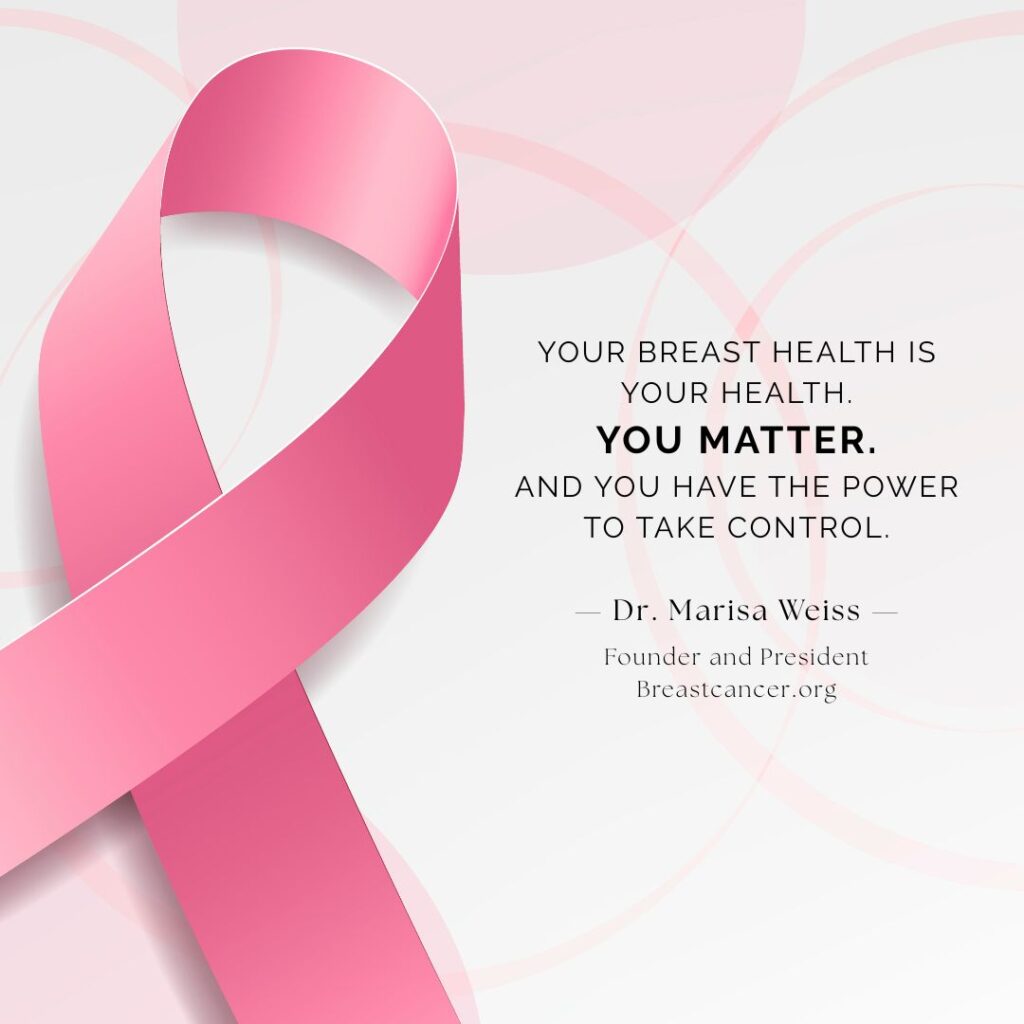Breast Cancer & Menopause: Empowering Women Through Awareness, Action & Advocacy

To continue our Breast Cancer Awareness Month blog series, we’re diving deep into the intersection of breast cancer and menopause—a critical space where awareness, science, and self-care must come together.
October is a powerful time to reflect, honor, and take action. At MenopauseNetwork.org, we stand with women of all ages, especially those navigating midlife transitions, where hormonal shifts, lifestyle stressors, and long-term health planning converge. This season is a reminder that knowledge isn’t just power—it’s prevention, treatment, and survival.
In this edition, we highlight key insights from Dr. Marisa Weiss, a leading oncologist, breast cancer survivor, and founder of Breastcancer.org, who recently appeared on The TODAY Show. Dr. Weiss offered a powerful look at what’s changing in breast cancer care—and how women can take charge of their health journeys, especially during perimenopause and menopause. Here’s what we learned:
Breast Cancer in a Changing Landscape
While breast cancer is often associated with older women, a troubling rise in diagnoses among women under 40 has experts concerned. Dr. Weiss pointed out in her TODAY Show interview:
“More women are being diagnosed at younger ages—and they’re not benefiting from early detection because screening guidelines don’t cover them.”
This means we need to rethink how we approach risk, screening, and education, especially for women in their 30s and early 40s who are often overlooked by standard protocols.
Hope Through Innovation: What’s New in Breast Cancer Treatment
Dr. Weiss shared that the current era of breast cancer care is one of hope, innovation, and personalization. Thanks to cutting-edge science, we’ve moved far beyond one-size-fits-all treatment models.
Key Advances Include:
- Targeted Therapies: Medications tailored to specific tumor markers
- Immunotherapy: Engaging the immune system to attack cancer
- Precision Radiation: Lower damage, faster healing
- Less Invasive Surgeries: More options for breast-conserving treatment
Women today have more tools than ever—and clinical trials are a critical way to access the newest options.
Dr. Weiss advises: “Ask your doctor: Am I eligible for a clinical trial? It’s not a last resort—it’s a smart move.”
The Power of Genetic Testing
If you’ve ever questioned whether you carry a hereditary risk for breast cancer, now is the time to act. Genetic testing can uncover mutations in genes like BRCA1, BRCA2, and others that significantly increase your lifetime risk.
Why It Matters:
- Determines which treatments will work best for you
- Provides insight into risk for other cancers
- Helps assess risk for your children and family members
Good news: The test is non-invasive (just saliva or blood), and most insurance plans now cover it.
Dr. Weiss shared that even young women—especially those with family history—should consider testing.
What’s Driving the Increase in Early Diagnoses?
We don’t yet know exactly why more young women are being diagnosed, but Dr. Weiss outlined several likely contributors:
| Potential Risk Factor | Lifestyle Link |
|---|---|
| Increased alcohol use | Many women in midlife drink daily or socially |
| Sedentary lifestyles | Desk jobs and long commutes reduce activity |
| Poor sleep & stress | Hormonal imbalance and emotional burnout |
| Processed foods | Inflammation and hormonal disruption |
“Most breast cancers aren’t inherited. They’re linked to how you live, what goes in, on, and around you.” — Dr. Weiss
Your Breast Health Action Plan (Especially During Menopause)
Let’s take Dr. Weiss’s powerful guidance and transform it into a practical, midlife-focused breast health checklist that you can start today.
1. Get Your Screenings Up to Date
- Women 40 and up should have annual mammograms
- If under 40 with family history, ask about early screening or MRI
- Include clinical breast exams in your annual wellness visits
2. Ask About Genetic Testing
- Especially if:
- You have a family history of breast, ovarian, or prostate cancer
- You’re of Ashkenazi Jewish ancestry
- You’ve had multiple cancer types in your family
- Talk to your doctor about BRCA or multigene panel testing
3. Consider Clinical Trials
- Access to new treatments before they hit the market
- Could offer better outcomes or fewer side effects
- Search for trials at clinicaltrials.gov or ask your care team
4. Transform Lifestyle Habits
Dr. Weiss reminds us that breast health = women’s health. Every change you make in your daily habits ripples across your health journey.
| Healthy Habit | Breast Health Benefit |
|---|---|
| 🏃♀️ Regular Exercise | Reduces estrogen levels and inflammation |
| 🥗 Mediterranean Diet | Rich in antioxidants, fiber, healthy fats |
| 🍷 Limit Alcohol | Keep to 1 drink/day or less |
| 🚭 Quit Smoking | Significantly lowers cancer risk |
| 😴 Prioritize Sleep | Supports immune function and hormone balance |
| 🧘♀️ Manage Stress | Reduces cortisol, inflammation, emotional strain |
Start with one. Build from there. Movement is a great first step, as Dr. Weiss noted:
“When you start with exercise, you’re more likely to succeed with everything else.”
5. Know the Warning Signs
Breast cancer symptoms aren’t always a lump. Be aware of:
- Breast or nipple changes in shape or texture
- New pain or swelling
- Unusual discharge
- Skin dimpling or thickening
Listen to your body. If something feels off, don’t wait. Early detection is everything.
Why Menopausal Women Must Be Proactive
Menopause is a pivotal time in a woman’s health journey. It’s also a window of opportunity—to catch risks early, modify habits, and advocate for yourself. Hormonal shifts can influence your breast tissue, and in some cases, increase risk.
If you’re considering HRT (Hormone Replacement Therapy), talk to your doctor about how it may impact your individual breast cancer risk.
Celebrating Breast Cancer Awareness Month — With Action
This October, let’s go beyond pink ribbons. Let’s take real steps toward real change. Whether you’re in your 30s navigating perimenopause or well into your 60s redefining your power, this is your moment.
Breast Health Checklist for Women 40+
✅ Annual mammogram
✅ Monthly self-exams
✅ Ask about genetic testing
✅ Get moving (150 minutes/week)
✅ Eat more plants & healthy fats
✅ Limit alcohol
✅ Prioritize sleep
✅ Quit smoking
✅ Manage stress
✅ Know your body & speak up
Resources
- Dr. Marisa Weiss on The TODAY Show – Watch here
- Breastcancer.org
- CDC Breast Cancer Information
- Genetic Testing Support
Every woman deserves access to lifesaving information, early detection, and compassionate care. Whether you’re seeking prevention strategies, navigating a diagnosis, or supporting a loved one, know this:

